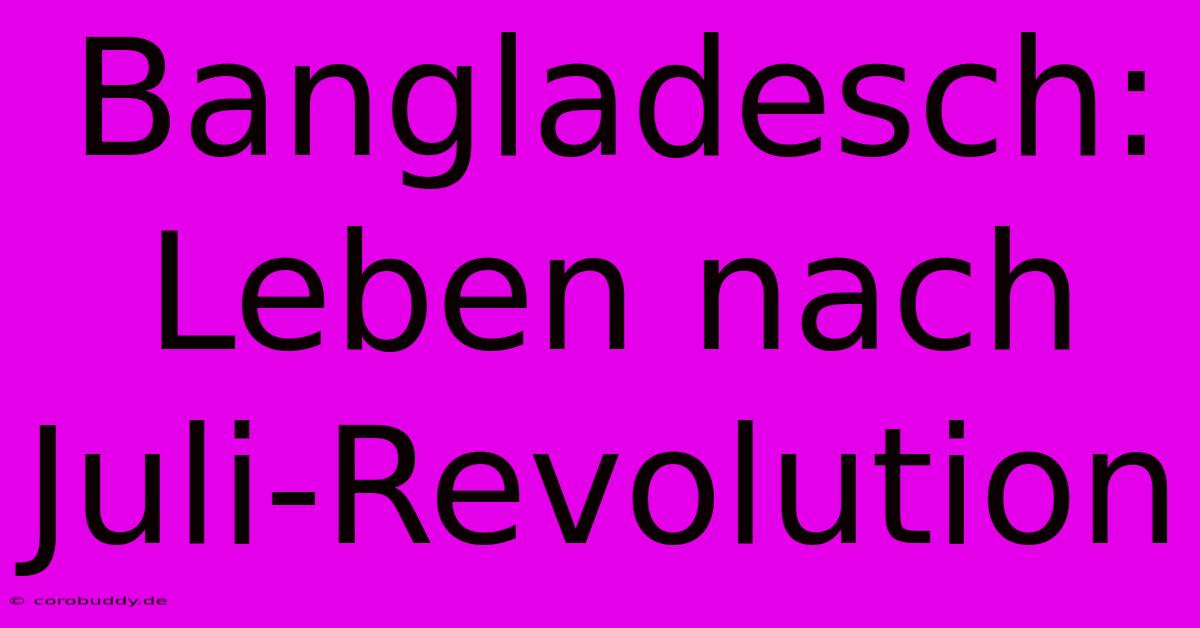Bangladesch: Leben Nach Juli-Revolution

Discover more detailed and exciting information on our website. Click the link below to start your adventure: Visit Best Website Bangladesch: Leben Nach Juli-Revolution. Don't miss out!
Table of Contents
Bangladesch: Leben nach der Juli-Revolution – Ein Blick hinter die Kulissen
Hey Leute! Let's talk about something super important: Bangladesch nach der Juli-Revolution. I know, it’s a heavy topic, but it’s one that's been on my mind a lot lately. I’ve been researching it for a while now, and honestly? It's a complex situation with no easy answers. This isn't going to be a dry academic paper; I want to share my thoughts and what I've learned in a way that's, well, relatable.
Die unmittelbaren Folgen: Chaos und Unsicherheit
Remember all those news reports right after the revolution? Total chaos, right? Curfews, protests, the whole nine yards. It was insane! I remember seeing pictures of the streets – completely deserted, a spooky kind of quiet. The initial impact on the economy was huge. Businesses were shuttered, supply chains disrupted. It was a mess. My cousin, who lives in Dhaka, told me stories about struggling to find even basic necessities. It was a real eye-opener. Getting reliable information was also a nightmare – so much misinformation was flying around. It felt like trying to assemble a jigsaw puzzle with half the pieces missing.
Die Rolle der sozialen Medien
Social media played a massive role, both good and bad. On one hand, it allowed people to share information and organize protests. On the other hand, it also spread a ton of fake news, which only fueled the chaos. I fell for a few fake news stories myself, unfortunately. Learned my lesson there, haha. Now I only trust verified news sources. Always double-check your facts, people! This is crucial for understanding events in a country like Bangladesh.
Der Weg zur Stabilität: Langsame Erholung
Things are slowly starting to get better, thankfully. The government is trying to rebuild infrastructure and boost the economy. It’s a slow process, though. There’s still a lot of uncertainty and people are still struggling. It's amazing how resilient people are, though. The spirit of the Bangladeshi people is something else.
Langfristige Herausforderungen
But here's the thing: the real challenges lie ahead. We're talking about long-term economic recovery, political stability, and social healing. It's going to take years, probably decades, to fully recover from this. I'm worried about the long-term effects on the young generation - the kids growing up amidst all this uncertainty. They need support and opportunity; otherwise, the future looks pretty bleak.
Ein Ausblick: Hoffnung und Widerstandsfähigkeit
Despite everything, there's still hope. The Bangladeshi people are incredibly resilient, resourceful and strong. I've seen countless examples of people coming together to help each other, rebuilding their lives, and fighting for a better future. They're truly inspirational. There are so many amazing NGOs and organizations working on the ground to provide support. They deserve all the help and recognition we can give them.
Learning about this situation really changed my perspective. It highlighted the importance of critical thinking, responsible news consumption and empathy. Let's all keep learning about Bangladesh, support the people and organizations doing amazing work there, and hope for a brighter future for the country.
Keywords: Bangladesch, Juli-Revolution, Folgen, Wirtschaft, soziale Medien, Fake News, Wiederaufbau, Stabilität, Herausforderungen, Hoffnung, Widerstandsfähigkeit, NGOs.

Thank you for visiting our website wich cover about Bangladesch: Leben Nach Juli-Revolution. We hope the information provided has been useful to you. Feel free to contact us if you have any questions or need further assistance. See you next time and dont miss to bookmark.
Featured Posts
-
Tuerkei Gegen Ungarn Nations League Playoffs
Nov 23, 2024
-
Valves Kampf Ums Ueberleben Vor Steam
Nov 23, 2024
-
Justizministerin Bondi
Nov 23, 2024
-
Stellenabbau Bosch Hildesheim Trifft Es
Nov 23, 2024
-
Das Skisprungfeuer Noch Nicht Aus
Nov 23, 2024
